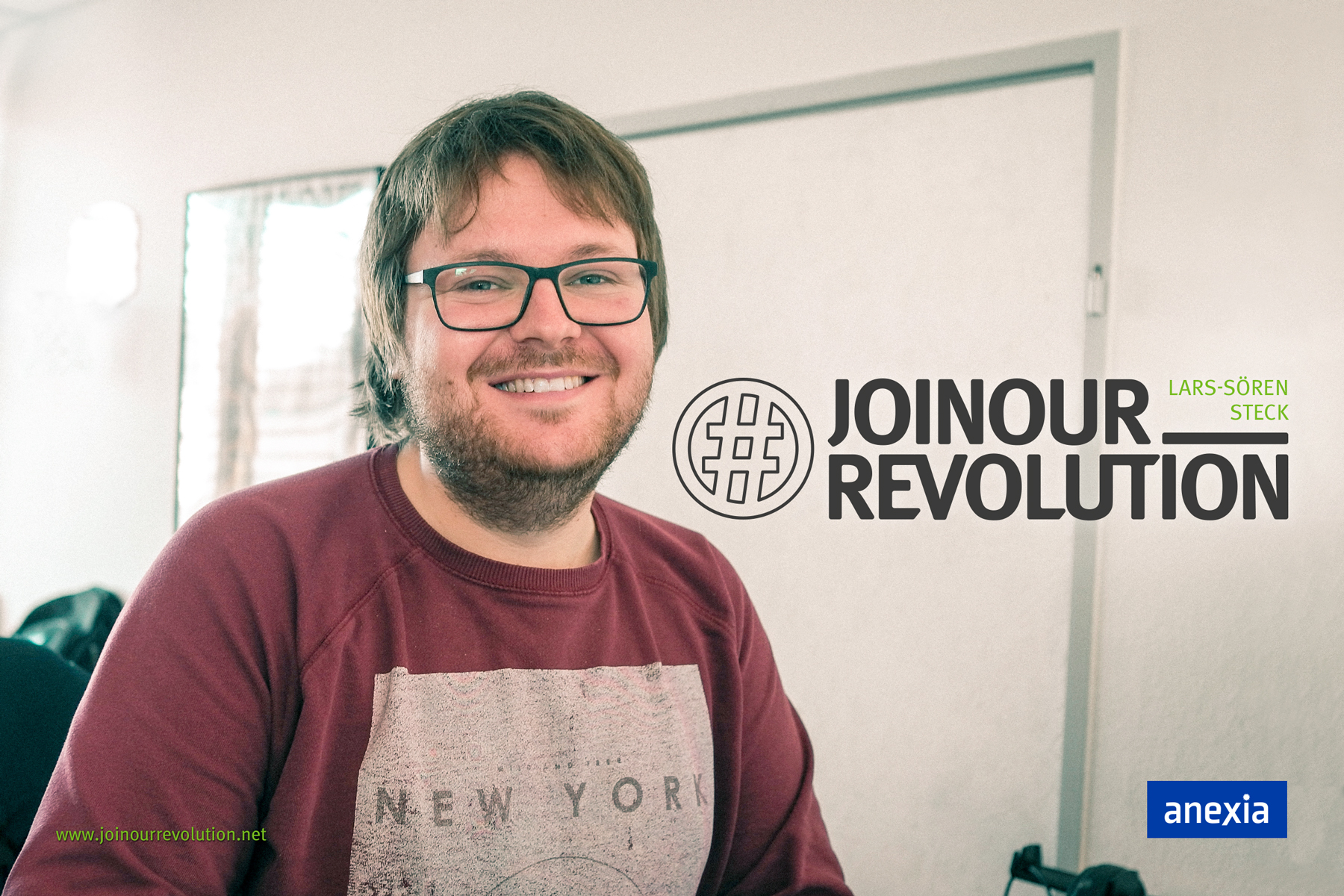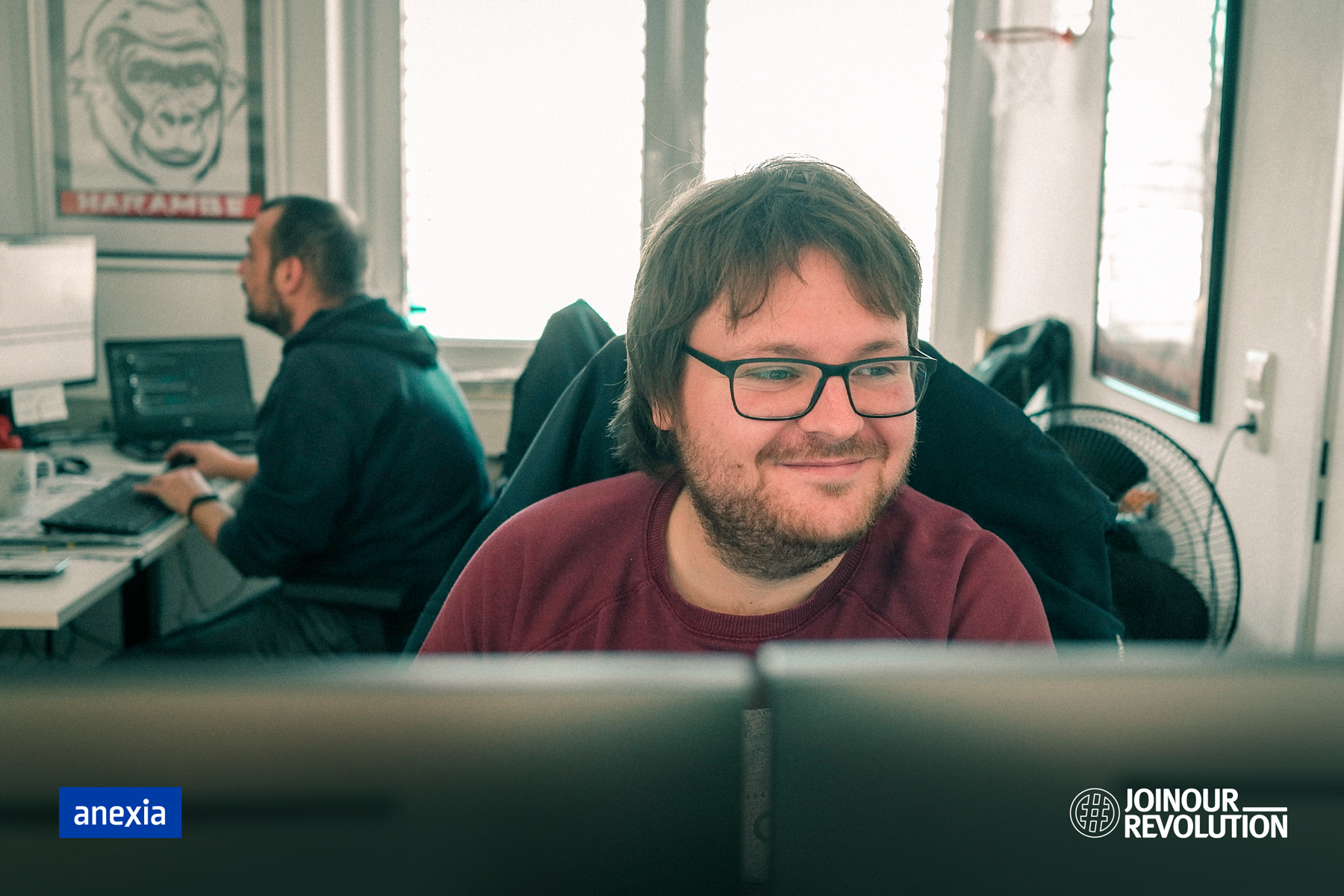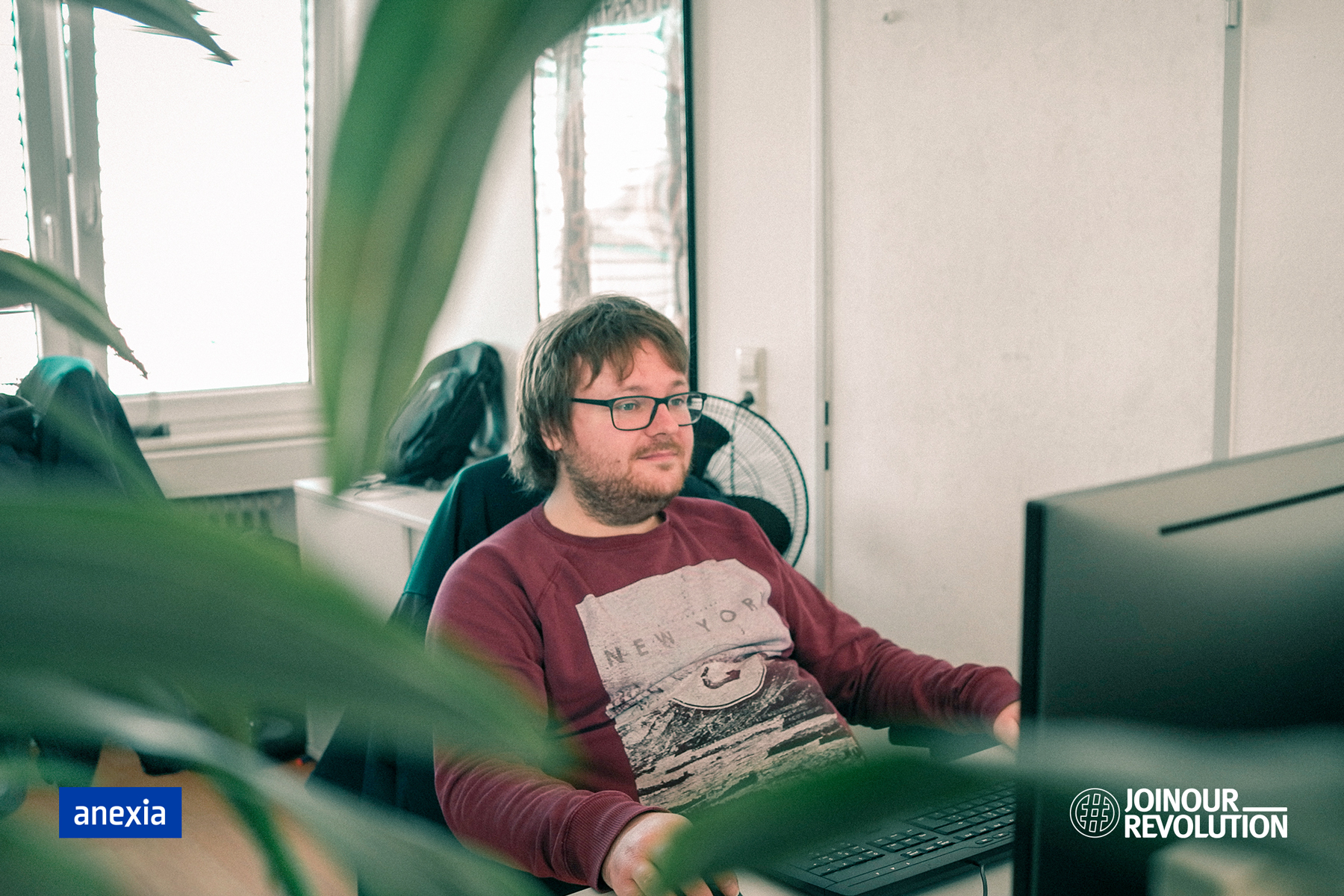Lars-Sören Steck: Linux Sysadmin
Mediator between technology and communication
Lars, 24, works at our office location in Karlsruhe. As Linux Sysadmin he is responsible for systems and customers of the Anexia subsidiary netcup. Lars is also part of the community management team. That means he is one of those who answer inquiries on Twitter and Facebook. This hybrid role is turning Lars into a mediator between technology and communication. In this interview, Lars told us how he is managing all his different responsibilities.
Lars, you are currently working at the office in Karlsruhe. Are you originally from there?
No, I originally come from the Lower Rhine region, from Rees, a town near the Dutch border. In my youth I lived in a boarding school in Bonn and went to school there. For my work at the Anexia subsidiary netcup I moved to Karlsruhe at the end of 2015.
How did you come to Anexia?
First, I started a dual study in the field of information technology. You usually work there for about three months and then study for about four again. I did the practical part in the company. But to be honest, I had some problems with my studies. It just wasn’t the right solution for me, and I quickly realized that. I enjoyed the practical work much more.
Together with my superiors Felix and Oli I decided to start an apprenticeship at netcup instead. Due to the fact that the start was only possible in half a year, I joined customer support to bridge this time period. At the beginning of 2019 I passed the final exam of the apprenticeship. Although I had made the exam half a year earlier than scheduled, I was among the best of the year in Karlsruhe with an A grade.
Congratulations! That sounds like a successful training period.
Absolutely, maybe that’s why I want to pass something on. I have been licensed as trainer at the beginning of this year. I am now allowed to train apprentices and from September on, I will be supervising my first apprentice. In addition, I have applied to the IHK (Industrie- und Handelskammer) as an examiner. I would like to examine IT specialists.
I think it’s important to accompany young people who are at the beginning of their careers in taking their first career steps.
What do you have to do to become an examiner? What is your motivation?
It’s a bit of a process until you can become one, but I actually attended a real exam just yesterday as a guest auditor. If everything works out, I will become part of the examination board in winter or next year and conduct final exams.
I am very happy to be able to do that. This is an voluntary position. If there is no one to volunteer, you would have to establish another system that would be less practical and much more expensive for the companies. The practical experience is just one of the big advantages of the dual training. But above all, I think it’s important to accompany young people who are at the beginning of their careers in taking their first career steps. To grade and evaluate them is a big thing.
How did you find out about netcup?
The fact that I applied to netcup was more of a coincidence. I knew the company from tests and that’s why I became a customer myself. I was satisfied with the products and I thought that if I apply to a company where I am already a customer and know the products from my own experience, the chances of getting the job will increase. That makes a very good impression. (laughs)
Was it a good decision?
Absolutely! I think it’s great that my career so far at netcup and Anexia provided me with so many different tasks. In the first months I have been mainly in customer support. Then I switched to the Operations department and continued my training there until the end. I am still in the team, but now I have also taken over some agendas from Community Management in a group-wide team that is responsible for several brands of the Anexia family. This variety is really unique.
What did you particularly appreciate about your training?
A very important and interesting experience was my time in customer support. I got to know all the systems of the company. From unique systems to standard systems, from small customers to big ones – I saw everything during my time in customer support . As a support employee you are at the front line, all inquiries are directed to you.
During my training I also appreciated that I could find my niche. My area of expertise is Linux system administration: automation, scripting, etc. Network on the other hand is something I have only basic knowledge in, as I had never gotten into it that well. But that was never a problem: Of course, I learned about it to the extent necessary for my education, but afterwards my colleagues made sure that I was spared a little more. (laughs) That was my wish and it was respected.
Nobody can do everything equally well. For a company, as well as for an employee or trainee, it is important that weaknesses are balanced, and strengths are promoted.
What will you especially pay attention to when you train your first apprentices?
I think it is important to give trainees the freedom of finding their own strengths and weaknesses. Nobody can do everything equally well. For a company, as well as for an employee or trainee, it is important that weaknesses are balanced, and strengths are promoted.
In the end, everyone should do what they have the most fun and motivation with. And, of course, find something where they are working most efficiently and productively. So, all sides profit from this. For trainees it is also very important to promote independence, to let them carry out their own tasks and later on also projects. Of course, as a trainer I am always there to help if there are any challenges.
You are part of the Community Management Team and are in charge of various social media channels. What skills do you need for this?
I’ve always had a knack for writing texts and finding the right words, and I’ve also shown the necessary diplomacy in my statements. That helps me a lot in this work, but of course it’s different if you write texts privately or if you do it in places where it’s a bit more hot-blooded.
In cases where a customer complains on Twitter or something similar, the experience and skills that I have gained in customer support and in my almost five years with the company in general also help me.
What do you generally like about your job? What motivates you?
I like the variety: I’m always saying, I’m more of a fire extinguisher. I like being in the day-to-day business and taking on the different tasks and challenges every day. For me this more exciting than working on huge projects that take several weeks and only then come to a conclusion.
I also enjoy seeing how a change that I make has a positive impact on all our customers. It’s a great thing when you have the opportunity to really make an impact and improve things. This is also what I enjoy in the area of Community Management. It gives me an feeling of the general sentiment in our customer environment and I see areas where we can improve or where everything is going well from the customer’s point of view. I think that’s really exciting and you can always take the appropriate measures and really feel the effects. So that is pretty cool.
Besides work, what do you do in your free time?
Of course, I am also very interested in IT in my private life. I use our services, for example from netcup itself and I also create websites for friends and clubs. Otherwise I read a lot, listen to music and watch videos on YouTube. I am not someone who goes out and celebrates. I like to go to concerts if it is music that I like, but currently that is a bit difficult.
What educational path would you recommend to someone who wants to do the same thing as you do?
I never regretted doing an education. If you want to become a system administrator, you don’t necessarily have to study. This doesn’t mean that system integration is easy. Studying certainly helps a lot, but e.g. in programming there are algorithms and mathematical knowledge that you should know. And this is not so common in system integration. In the apprenticeship you get the necessary knowledge. Nevertheless, it’s important that you always keep up to date with the latest developments. Many things change and you have to be aware of that. So, it helps if you are very IT-affine and also do a lot in this area in your private life. You learn something new every day.
I can’t say too much about the area of Community Management, because I somewhat slided into it myself. I think you must have a distinctive linguistic expression to be able to do this well. It helped me a lot that I read three or four novels a week as a teenager, so almost all my free time. Through reading I acquired a great vocabulary. I think you need to have a talent for that, it’s something that just comes naturally. You should also have a good overview of all systems and processes in the company.
Lars dared to take the step from apprentice to examiner. Are you also committed and ready to change something? If you are looking for a new challenge apply now:


